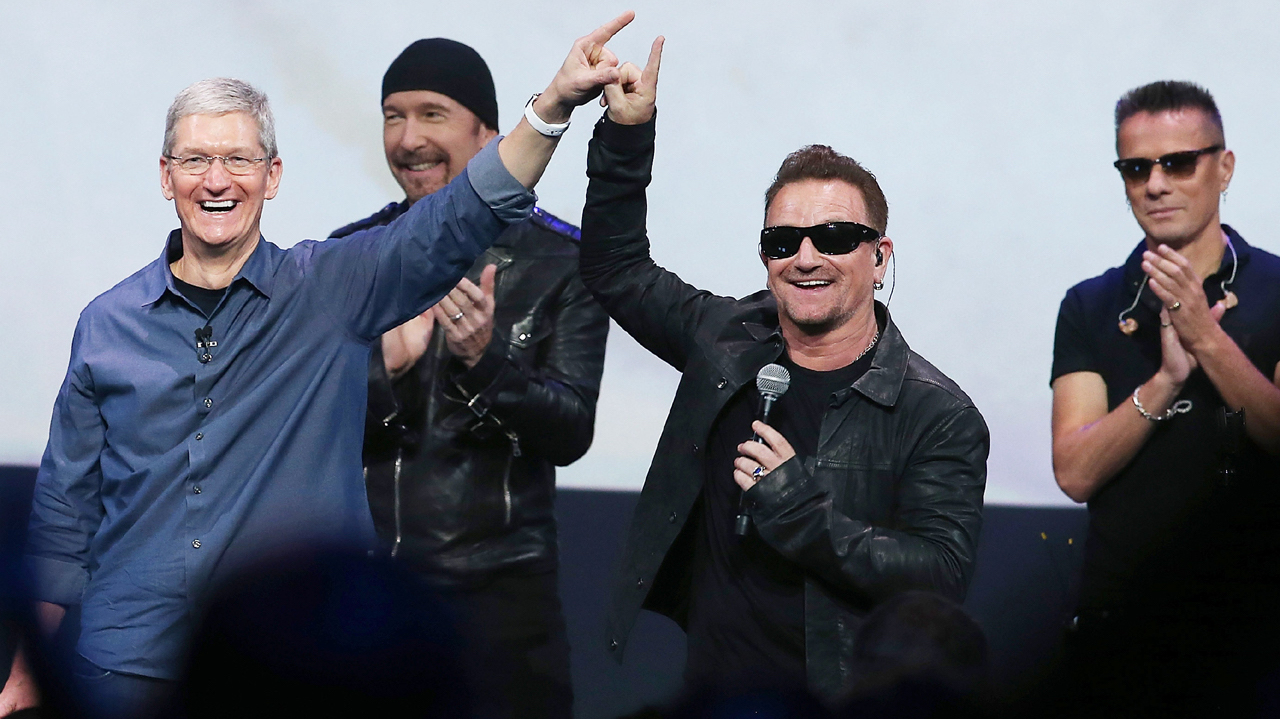Bono apologizes again for U2 iTunes album disaster, revealing surprisingly deep relationship with Apple
A new book from the U2 singer spills the beans on the band’s relationship with Apple.

iMore offers spot-on advice and guidance from our team of experts, with decades of Apple device experience to lean on. Learn more with iMore!
You are now subscribed
Your newsletter sign-up was successful
Everyone loves a freebie, right? Not always, as Apple and Irish rockers U2 found out in 2014, when the band gave away its album Songs of Innocence directly into people’s iTunes music libraries – whether they wanted it or not.
Both the band and Apple faced a dramatic backlash, with Apple eventually having to issue instructions on how to remove the album.
“I take full responsibility,” says Bono (real name Paul Hewson), in his new autobiography, Surrender: 40 Songs, One Story, in an excerpt from the Guardian.
“If just getting our music to people who like our music was the idea, that was a good idea,” writes Bono.
“But if the idea was getting our music to people who might not have had a remote interest in our music, maybe there might be some pushback. But what was the worst that could happen? It would be like junk mail. Wouldn’t it? Like taking our bottle of milk and leaving it on the doorstep of every house in the neighborhood."
Not. Quite. True.
“On 9 September 2014, we didn’t just put our bottle of milk at the door but in every fridge in every house in town. In some cases we poured it onto the good people’s cornflakes. And some people like to pour their own milk. And others are lactose intolerant.”
iMore offers spot-on advice and guidance from our team of experts, with decades of Apple device experience to lean on. Learn more with iMore!
It seems that the years following the debacle have been a period of reflection as to the underlying argument for why people were so annoyed at the decision.
“Quite quickly we realized we’d bumped into a serious discussion about the access of big tech to our lives. The part of me that will always be punk rock thought this was exactly what the Clash would do. Subversive. But subversive is hard to claim when you’re working with a company that’s about to be the biggest on Earth.”
The one thing more important than price? Choice.
From iTunes to music subscriptions
A study at the time revealed that just a quarter of iTunes users ever listened to the album, but the stunt did reveal an interesting glimpse towards the future of music consumption: subscriptions, something that Bono says he anticipated.
“The whole point of what we’re trying to do at Apple is to not give away music free. The point is to make sure musicians get paid,” Bono recounts CEO Tim Cook saying. He continues:
‘“No,” I said, “I don’t think we give it away free. I think you pay us for it, and then you give it away free, as a gift to people. Wouldn’t that be wonderful?”
‘Tim Cook raised an eyebrow. “You mean we pay for the album and then just distribute it?”
‘I said, “Yeah, like when Netflix buys the movie and gives it away to subscribers.”’
And that’s certainly the primary music consumption method these days, with Apple Music, Spotify, Amazon Music, Tidal, and others offering millions of tracks for a monthly fee – along with the choice as to whether or not to listen to those U2 classics.
When U2 met Jobs
Bono’s autobiography looks set to have quite a few interesting anecdotes for tech fans – love them or loathe them, the band’s ambitious stage shows means that they’ve always had an eye on innovative technologies they can take on the road with them.
But the iTunes debacle isn’t the only Apple-related story in the book, either. Bono recalls a meeting between U2 and Apple founder Steve Jobs in his Palo Alto home, where the singer claims the band pitched their own appearance in one of the day-glo iTunes adverts. Not only that, but Bono claims it was his own pitch that saw the black and red iPod manufactured, despite initial skepticism from Jobs – though a stock option in the company rather than a fee was outright refused, unsurprisingly.
“The iPod was about to turn Apple from a medium-sized world-class hardware and software player into a global Godzilla [...] We were fortunate to ride the Apple wave through that period...
The fantastically kinetic commercial brought the band to a younger audience and thousands of people bought the U2 iPod just because it wasn’t white. Apple was on a ride to infinity and beyond; we were just lucky to hitch a lift. You couldn’t buy a ticket.”
Surrender: 40 Songs, One Story by Bono, is released on November 1. And don’t worry, you’ll have to choose to buy it if you want to read more.

Gerald Lynch is the Editor-in-Chief of iMore, keeping careful watch over the site's editorial output and commercial campaigns, ensuring iMore delivers the in-depth, accurate and timely Apple content its readership deservedly expects. You'll never see him without his iPad Pro, and he loves gaming sessions with his buddies via Apple Arcade on his iPhone 15 Pro, but don't expect him to play with you at home unless your Apple TV is hooked up to a 4K HDR screen and a 7.1 surround system.
Living in London in the UK, Gerald was previously Editor of Gizmodo UK, and Executive Editor of TechRadar, and has covered international trade shows including Apple's WWDC, MWC, CES and IFA. If it has an acronym and an app, he's probably been there, on the front lines reporting on the latest tech innovations. Gerald is also a contributing tech pundit for BBC Radio and has written for various other publications, including T3 magazine, GamesRadar, Space.com, Real Homes, MacFormat, music bible DIY, Tech Digest, TopTenReviews, Mirror.co.uk, Brandish, Kotaku, Shiny Shiny and Lifehacker. Gerald is also the author of 'Get Technology: Upgrade Your Future', published by Aurum Press, and also holds a Guinness world record on Tetris. For real.
